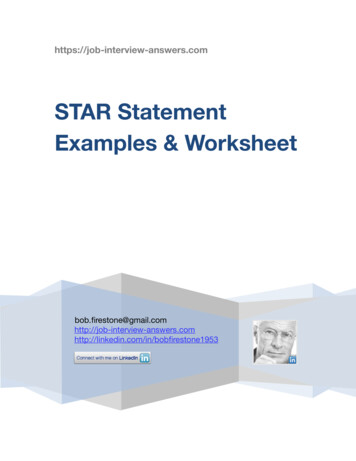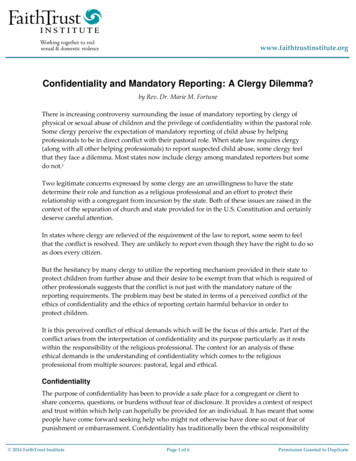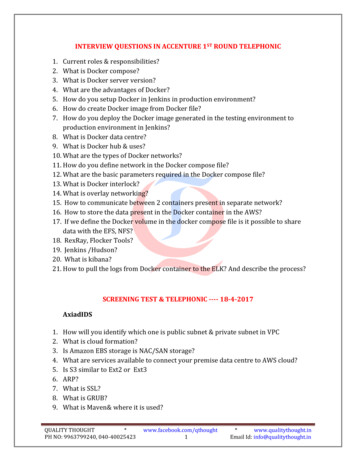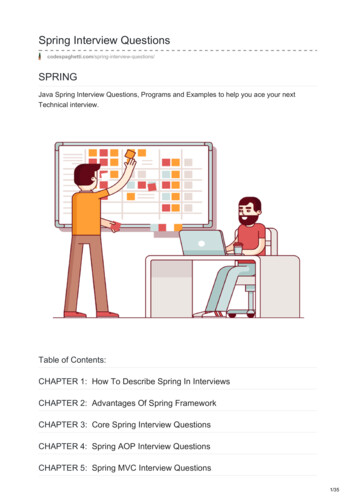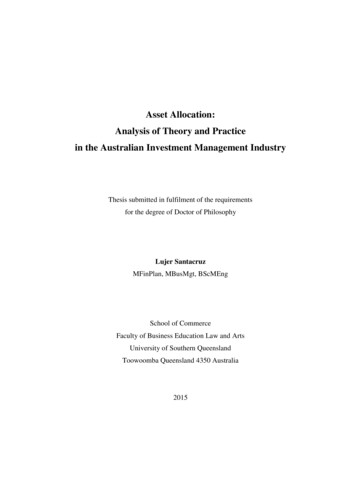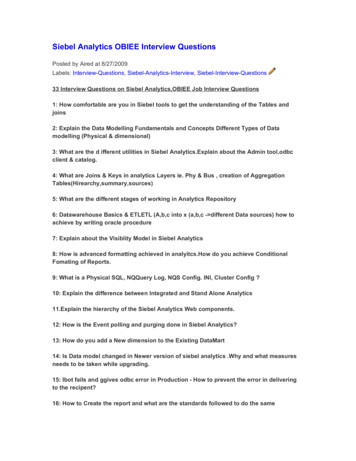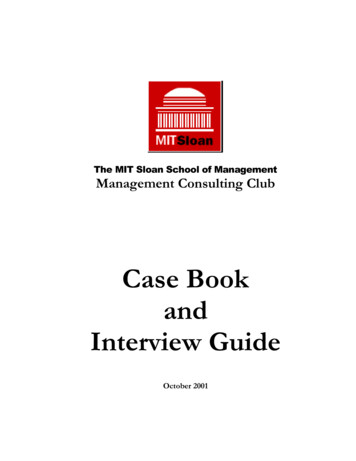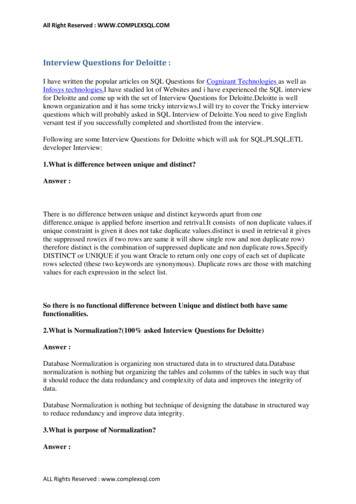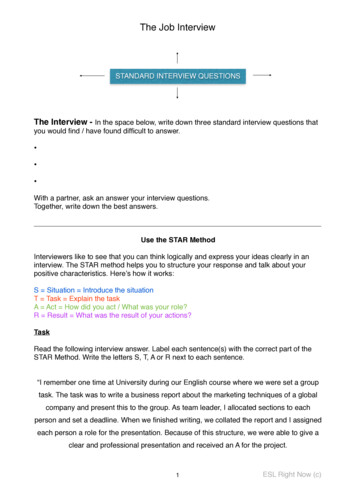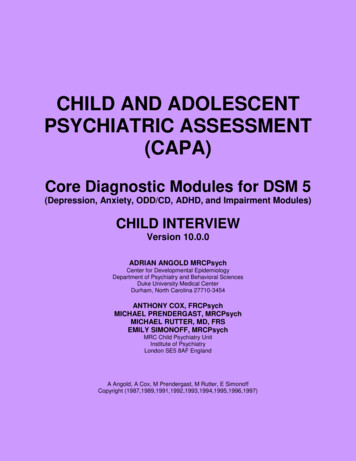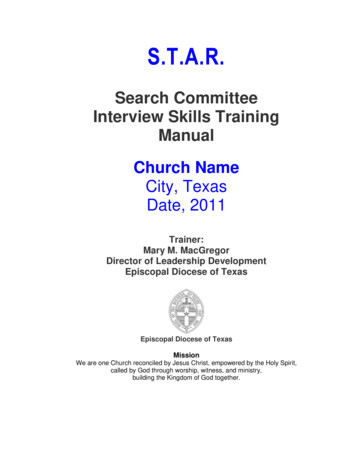
Transcription
S.T.A.R.Search CommitteeInterview Skills TrainingManualChurch NameCity, TexasDate, 2011Trainer:Mary M. MacGregorDirector of Leadership DevelopmentEpiscopal Diocese of TexasEpiscopal Diocese of TexasMissionWe are one Church reconciled by Jesus Christ, empowered by the Holy Spirit,called by God through worship, witness, and ministry,building the Kingdom of God together.
Prayer for a New RectorAlmighty God, giver of every good gift: Look graciously onName ofChurchand so guide the minds of those who shall choosea rector for this parish, that we may receive a faithful pastor,who will care for your people and equip us for our ministries;through Jesus Christ our Lord. AmenBook of Common Prayer, p. 81-2-
PLACEHOLDERChurchCity, TXDate, 2011S.T.A.R. Training for Search CommitteeAGENDAOpening Prayer1:00 – 1:30 p .m. Discuss the following questions:What are this congregation’s core values?What is this congregation’s mission?What is this congregation’s vision for the future?What is this congregation looking for in a rector?What is the rector profile?How does this profile reflect particular behaviors?1:30 – 1:45 p.m. Clergy Interview Guide and Key Background Review1:45 – 2:45 p.m. Focus Areas for Interviewing & Behavioral DimensionsReview Focus AreasWhat are behavioral dimensions? ReviewSmall Group WorkEach group selects focus areas and behavioral dimensions fromthose assigned to the group that align with the church’s need2:45 – 3:00 p.m. BREAK3:00 – 3:20 p.m. Small Group ReportsEach group reports chosen dimensions and focus areas thatbecome the initial areas the group will use for developing questions3:20 – 4:00 p.m. Asking questions based on the S.T.A.R. methodGuide for Creating Behavioral QuestionsElements of a STARFalse STARsVague AnswersFollow Up Questions to Build Complete STARsRatingIndividual Team Member’s Sample Dimension Question SheetAfter Interview Communication/Impact Assessment Team Rating SheetFinal Record After Team VisitReaching Consensus as a TeamWhole Search Committee Discussion After 2 Team Visits4:00 – 4:30 p.m. Homework for Search Committee members, Search Committeework to develop an Interview Guide, Q&A, Search Process ReviewClosing Prayer-3-
S.T.A.R. TRAININGforSEARCH COMMITTEESThe Episcopal Diocese of Texas is committed to assisting its congregations in beingprepared to undertake the most productive searches possible for new rectors. The work of asearch committee is simply to find the best candidate to be the next rector of their church.This candidate should be a good fit for the culture and need of the church at the time of thesearch. This training method will assist search committee members to do this work well.Prior to search committee training, it is very important that churches have clearly defined theiridentity through core value and mission statements. In addition, leaders of a church should beable to articulate clearly the vision for the near future of the congregation. This informationinforms a future rector profile which should define the characteristics, demonstratedbehaviors and accomplishments of the optimum candidate for the position. Once a churchhas completed this work it is time to gather a committed and capable search committee whowill actually do the interviewing and recommendation of a final candidate to the vestry.The STAR method of interview skills training helps members of a search committeefocus on the specific criteria for a rector. In addition, it provides a method whereby thecommittee members can hone their ability to interview and gain relevant and extremelyimportant information which can ultimately inform their evaluation of the candidates.The STAR method was derived from a secular human resources interview skills trainingprogram. However, it has been completely overhauled and adapted to meet the life of acongregation. It is based on the premise that future performance can be predicted by pastbehavior.The contents of this notebook can be edited and changed to address the specific needs,culture, and vision for a church. It has many questions which can be used verbatim or editedto best fit the need of the congregation. In addition, it focuses on the multiple areas in whichquestions can be created using the STAR method. It is best utilized as a framework for asearch committee’s interviewing, discernment and evaluation process.-4-
THE INTERVIEW3 Parts1. Opening, informal, background, casual intro into more formal questionsPassion question2. STAR QUESTIONS – highly structured portion of the interview3. Candidates time for questions of his/her choiceInterviews often last 4-5 hours, including a meal at the beginning or at the end. Make sure toinvite the spouse, if there is one, in advance for the meal. The search committee should payfor any costs incurred in this visit. (of course these costs should be supported by the searchcommittee’s budget).The interview should be held at a neutral location.Follow up should be made to the interviewee as soon as the whole search committee hashad a chance to discuss the results of the interview session. The candidate should be told ifthey will remain on the list, or be thanked for their time and told that they will not be underfurther consideration.-5-
CLERGY INTERVIEW GUIDE BEFORETHE INTERVIEW (pre-interview preparation) Each team member review: The candidate’s informationPre-selected questions, dimension definitions and key actions Tailor the questions to the candidate’s experience Appoint respective jobs for the team, including the opener, note taker, etc.Part 1 OPENING(5 minutes) Greet the candidate Start with prayer.Each person introduces him/herself.State that the team appreciates the candidate’s interest in the church and the rector’s position.Complement the candidate on his/her experience and accomplishments.Thank the candidate for adjusting his/her schedule for the interview. Explain the interview’s purpose: To get acquainted.Learn more about the candidate’s background and experience.Help the candidate understand the particulars of the position and the uniqueness of the church.BACKGROUND INFORMAL REVIEW (20-30 minutes – see p.6-considered informal time) Ask about the candidate’s submitted materials KEY Review candidate’s materials (resume, advance information sent to the search committee)and ask any questions, note highlights and note relevance to this church’s position opening. Jobs and experience Review information about the candidate’s prior work.Note any background that is unclear or areas for which you would like more information. Gaps If there are gaps in the candidate’s employment or educational history, make a note to discussthem during this background review. Passion Question An open-ended question about the interviewee’s passion around their ministry/workPart 2 THEFORMAL INTERVIEW (up to 2 hours) Describe the interview structure by explaining that you will: Review the candidate’s jobs and ministry experiences, ask for specific examples of actionshe/she has taken in these jobs/experiences and results from these actions.Ask the candidate’s theological and philosophical positions pertaining to the church and ministry.Answer any questions about the church and the rector’s position without getting into anyfinancial considerations for the position.Take notes during the interview.PLANNED S.T.A.R. QUESTIONS (7-10 minutes per dimension or focus area)OTHER QUESTIONSPart 3 CANDIDATE’S QUESTIONS ABOUT THE CHURCH ( /- 1 hour)CANDIDATE SHARES OTHER INFORMATION HE/SHE WOULD LIKE THESEARCH COMMITTEE TO KNOWCLOSE – WITH PRAYER AND ASSURANCE OF FOLLOW UP NOTIFICATION(letter or phone call)-6-
KEY BACKGROUND REVIEWTeam Member SheetCANDIDATE:MOST RECENTPOSITION/LOCATION: What(are/were) your major responsibilities in your (current/most recent) position? (Do/Did)you supervise anyone? How many? What were their positions? What aboutvolunteer positions? Whatinterests you the most about this possible new opportunity? Whatgives you pause about the possibility of this new opportunity? Why(do/did) you want to leave? Whataspects of ministry are you most passionate about and why?Communication Rating:Impact Rating:-7-
(The Passion Questions)The following 2 questions are open ended, leaving the interviewee to select the situation theyare probably most proud of doing. The answer will give the interviewers a great deal ofinformation on which to dig deeper and reveal actions and results. It will speak to themotivation behind the actions rather than the skill set as is discerned through behavioraldimension questions. They are good opening questions, focusing the individual onaccomplishments and usually positive feelings.1. Situation, TaskTell us something that you have accomplished in your career about which you are mostproud.ActionSpecifically, how did you accomplish it?ResultWhat has been the result of this work?OR2. Situation, TaskShare with us something that you accomplished in ministry that was animportant achievement for you?Situation, TaskWhat were some of the specific actions you had to take in order to do this?ResultWhat were some of the results of this work?-8-
FOCUS AREAS FOR INTERVIEWINGDURING A SEARCH PROCESSThe following focus areas cover most aspects of the work of a rector. Questions could bedesigned around as many areas as deemed appropriate. The questions are best designedwith STAR components and decided in advance of interviews. Those areasnoted with ( ) are defined behavioral dimensions and are included in this notebook.Personal LifePrayer/Devotional Life and Self CareFamily Life-Balance of Work and Home LifeStress Tolerance (S)Personal Mission StatementTheologyDemonstrating Personal Theology (P)Episcopal Church/National PolicyMinistry of the PriestMinistry of the LaityAbortion, Birth, Baptism, Confirmation, Marriage, Divorce, DeathSpiritual GiftsPersonal GiftednessGiftedness of Others and Empowerment for UtilizationPersonal Passion for Particular MinistryActions Motivated by Spiritual Gifts (G)Leadership StyleLeading through Values, Mission and Vision(V)Initiating Action (A)Building Trust (T)Gaining Commitment (C)Delegating Responsibility/Setting Boundaries/Expectations (D)Work Standards and Expectations of OthersBuilding Parishioner - Staff Loyalty/Listening/Acknowledging/Building Relationships (L)Coaching/Contributing to Team Success(CC)Management StyleCommunication (CM)Decision MakingBuilding Strategic Working RelationshipsManaging ConflictTeam BuildingOrganizational DevelopmentMeeting Leadership/Small Group Development(M)Organizational Design/Restructuring to Address Mission, VisionVestry DevelopmentSmall Group Development6/09-9-
Worship/LiturgyPreferencesPreaching (PR)Experience with Different StylesOpenness/Opinion of Diversity in LiturgyControl/Delegation/InvolvementExpanding Worship Opportunities beyond SundayPastoral CareDecisions About When to get Involved in Parishioner’s Pastoral NeedsOverseeing Comprehensive Ways to Cover Congregation’s Pastoral NeedsTraining/Deployment of Others to do Pastoral CareChristian FormationExperience/Value Placed on Christian Education for Children, Adults, Bible Study/VacationBible School, etc.Personal Involvement in TeachingExperience with Programs for Christian Formation (DOCC, EFM, etc.)Involvement/promotion of Spiritual Development Opportunities(Cursillo, EFM, Faith Alive, Discovery, Alpha, spiritual direction, etc.)EvangelismPersonal Involvement in Inviting Others into a CongregationTraining Parishioners for Inviting Others into a CongregationOversight/Involvement of Systematic Invitation, Welcome, Assimilation of NewcomersExperience with Setting and Achieving Objectives in EvangelismStewardshipExperience/degree of Personal Involvement in Annual CampaignsExperience with Capital Campaigns/building New FacilitiesDay SchoolsExperience with Day Schools on Church PremisesMother’s Day Out ProgramsYouth MinistryExperience with Development of a Youth MinistryDegree of Personal Involvement with Youth MinistrySelection/Oversight of Youth Ministry StaffOutreach MinistriesExperience/degree of Personal InvolvementDeveloping Outreach OpportunitiesForeign and Domestic Missionary WorkLiving in a Community With Changing DemographicsExperience living in a community where demographics are changingExperience as an ordained person/leader of a church in a changing communityNeeds/Expectations for self and family living in a community such as the one the church islocated- 10 -
TABLE OF CONTENTS WITH CODESFORBEHAVIORAL DIMENSION QUESTIONSPageLBuilding Parishioner-Staff Loyalty/Listening/Acknowledging/Building Relationships .12TBuilding Trust 14CGaining Commitment .16DDelegating Responsibility/SettingBoundaries/Expectations 18MMeeting Leadership/Small Group Development .20SStress Tolerance .22GActions Motivated By Spiritual Gifts .24PRPreaching .26AInitiating Action .27VLeading Through Mission, Values and Vision .29PDemonstrating Personal Theology 31CM Communication .33Coaching/Contributing to Team Success 35CC- 11 -
Behavioral Dimension LBuilding Parishioner-Staff ipsDefinition-Effectively meeting parishioner needs: building productive relationships; takingresponsibility for a level of satisfaction and loyalty on the part of the parishioner by beingopen, accessible, listening.Key Actions Uses key Principles of Listening – Establishes good interpersonal relationships byhelping people feel valued, appreciated, and included in discussions (which enhancesself-esteem, empathizes, involves, discloses, supports). Acknowledges the person – Actively greets parishioners and gives them his/herattention Clarifies the current situation- Asks questions to determine needs; listens carefully,provides appropriate information, summarizes to check understanding. Takes the “heat” – Handles upset parishioners/staff by hearing them out,empathizing, taking responsibility to assist the person to resolve the issueSample Job Activities Interacts with parishioners who, when interacting, acknowledges their presence in awarm and friendly manner Acts attentively and is able to ask questions and respond to persons will skillduring conversations Works to effectively defuse the emotions of disgruntled parishioners/staff by usinggood listening techniques and offering assistance when appropriatePossible Interview QuestionsL1. Sooner or later clergy will have to deal with a parishioner who makes unreasonabledemands. Think of a time when you had to handle an unreasonable request from aparishioner. What was the request and what did you do?L2. What skills/qualities/giftedness do you have that contribute to building productiverelationships with people? Can you recall a time when you had to focus on yourskills/qualities/giftedness to address a particular situation with a church leader or member?What was the situation and what happened as a result?L3. Tell me about a time when you were the focus of a parishioner’s displeasure. What didyou do? What ultimately happened as a result of your action?L4. Describe a situation when you chose to involve others to help solve a parishioner’s crisis.What was the crisis and how did you engage others in helping? What ended up happening?- 12 -
Behavioral Dimension L(continued)L5. Tell me about an experience where your careful listening impacted your actions inresponse to a highly emotional situation. What ended up happening?L6. Describe a time when it was particularly important to establish a good relationship witha staff member. How did you do this? How was the relationship developed as a result ofyour actions?L7. Describe the actions you take to foster relationship building between staff members.Share with us an example of a time when these actions made a big difference in handlinga difficult situation. What were the ultimate results?L8. Tell me about a time when you knew a key parishioner was unhappy with the church.What action did you take to resolve the situation? What resolution was there if any?Your Notes:- 13 -
Behavioral Dimension TBuilding TrustDefinition – interacting with others in ways that build confidence, faith in the relationship andtrust.Key ActionsOperates with integrity- demonstrates honesty; keeps commitments; behaves in aconsistent manner. Discloses own positions-shares thoughts, feelings, and rationale so that othersunderstand personal positions. Remains open to ideas-listens to others and objectively considers others’ ideas andopinions, even when they conflict with one’s own. Supports others- treats people with dignity, respects, and fairness; gives propercredit to others; stands up for deserving others and their ideas even in the face ofresistance or challenge.Sample Job Activities Keeps promises and commitmentsTreats individuals with Christian love, acceptance, fairly and equallyHandles confidential information wellAccurately communicates the strengths and limitations of the churchAllows people to learn from mistakes as they work in the church but takes actionto encourage persons’ personal and spiritual growth Empowers people to take on responsibility to carry out important tasks, encouragesthem, and works hard to not tell them what to do, censure or do the work for themPossible Interview QuestionsT1. Share with me an example of a situation when you knew it was critical to build aparishioner’s/staff member’s trust. What did you do to build that trust and what were theresults of your actions?T2. Tell me about a time when you had to objectively consider a church leader’s/staffmember’s ideas, be open to them, even though they conflicted with yours. What were theideas? How did you disclose your opinion? What were the results of your willingness toconsider the other person’s ideas?T3. Sometimes parishioners act in an unethical manner. Give me an example of a situationwhen you saw a parishioner do something you thought was very inappropriate. What did youdo to respond as their priest? What happened as a result?- 14 -
Behavioral Dimension T(continued)T4. It’s often easy to blur the distinction between information meant to be kept in confidenceand information meant to be shared. Can you give me an example of a time when you wereworking with a lay leader and you faced this dilemma? What did you do? What ultimatelyhappened?T5. Tell me about a situation where you publicly supported a parishioner/staff member whowas being criticized for his/her ideas. What happened? What difference, if any, did yoursupport create?T6. Give me an example of a time when you chose to delegate a great deal of responsibilityto a staff member/parishioner. What was the situation? How did you convey your trust? Whatwas the outcome?T7. Share with us an example from your life experience that conveyed a powerful messageabout trust in God. What was the experience and what was the message? Were you aware ofany response to your message? How did you know-what was the response?T8. Describe for me the routine ways in which you affirm your staff members. What do youdo? Tell us about a particular situation when you felt it critical to affirm/support a staffmember and what happened as a result of you doing so.Your Notes:- 15 -
Behavioral Dimension CGaining CommitmentDefinition - Using appropriate interpersonal styles and techniques to gain acceptance of ideasor plans; modifying one’s own behavior to accommodate tasks, situations, and individualsinvolved.Key Actions Opens discussions effectively-describes expectations, goals, requests or futurestatements in a way that provides clarity and excites interest Develops others’ and own ideas – presents own ideas; seeks and developssuggestions of others Facilitates agreement – uses appropriate influence strategies (such as Biblicalsupport, the church’s values, mission, vision) to gain genuine agreement Closes discussions with clear summaries- is able to establish next stepsSample Job Activities Uses authority of rector (e.g. “because I said so”) only as a last resort to enforcea decision Is the bearer of the church’s mission, values and vision and works to remind thecongregation and people in decision making positions of the foundational importanceof these statements Encourages/allows forums for the congregation to share ideas Remains actively aware of the progress of the congregation in achieving its goals,objectives and can articulate its progress toward those endsPossible Interview QuestionsC1. What techniques have you used to gain acceptance of your ideas or plans for yourcongregation? Give me an example of a time when you used one of these techniques. Howcould you tell that acceptance of your ideas/plans had been gained?C2. Not everyone agrees with decisions made by leaders. Tell me about an unpopulardecision you had to make as a priest (rector, assistant rector) and how you gainedacceptance from the vestry or a committee that was responsible for helping you carry thedecision out.C3. What are the most successful methods you have used to help individuals grow in theircommitment to Jesus Christ? Give some specifics. Tell us about a parishioner, their journey,current status in their spiritual growth and the role you played.C4. Tell me about a situation when you encountered a parishioner whose theology, in yourjudgment, was really misguided. What did you do? What happened as a result?C5. Tell me about a way you have provided a means or encouraged the sharing of ideas toimprove a current program at your church. What have you done to help assure that theseideas get put into action?- 16 -
Behavioral Dimension C(continued)C6. Give me an example of a time when you influenced some parishioners/ staff members tocarry out a ministry in a new and different way. What was the situation and what ultimatelyhappened?C7. Tell me about a time when you influenced a parishioner to take on a difficult assignment.What did you do to convince the person to take on this responsibility? What was theoutcome?C8. Give us a real life example of a situation that demonstrates how you facilitatedagreement about a very significant action that needed to take place. What was the action,how did you facilitate the agreement, and what ultimately was the result?Your Notes:- 17 -
Behavioral Dimension DDelegating Responsibility/Setting Boundaries/ExpectationsDefinition- Allocating decision making authority and /or task responsibility with correspondingexpectations to empower others for maximum individual and organizational effectiveness.Key Actions Shares appropriate responsibilities-allocates decision-making authority and/or taskresponsibility in appropriate areas to empower individuals for ministry Defines parameters-clearly communicates the parameters of the delegatedresponsibility, including decision making authority and any required actions,constraints, or deadlines Provides support without removing responsibility-suggests resources andprovides assistance or coaching as needed, expresses confidence in the individual Stays informed-establishes appropriate procedures/clear communication channels tokeep informed of issues and shared responsibility work.Sample Job Activities Delegates assignments to the appropriate individuals based on their God given gifts,talents, abilities and passions Provides guidance and instruction when delegating Respect areas of decision making that have been delegated, stands behind theirdecisions Clearly communicates the authority to the person/committee/ group involved so thatthere is no misunderstanding. Establishes accountability measuresPossible Interview Questions:D1. Tell me about a time when you didn’t provide enough instruction for a task that youdelegated to a parishioner/staff member resulting in poor follow through. How and when didyou find out that things weren’t going well? What action did you take to correct it?D2. Recall a task you have delegated to a committee or person at your church. Whataccountability procedure did you require of that committee/person? Describe how thiscommittee/person has responded to this requirement.D3. Tell me about the last major project/task/ministry you delegated. How did you decide towhom you would delegate? What did you do to establish clear directives? What happened asa result?D4. Talk about your theology of empowerment from a priest/leader’s perspective. Give anexample of a time when you empowered someone to do a significant project and ultimatelythe result of that empowerment.- 18 -
Behavioral Dimension D(continued)D5. Give me an example of how you have communicated your trust and confidence in arecent delegation of responsibility to a committee or leader. What did you delegate and howwell did that committee/person handle the delegation of responsibility?D6. Tell me about one of the most difficult problem-solving assignments that you’vedelegated. Why was it difficult? What ultimately happened?D7. Tell me about an action you have taken with your congregation that demonstrates yourtheology of empowerment of individuals to do ministry. What difference have you witnessedas a result of this empowerment? Be specific.D8. Tell me about a situation when you empowered a staff member with a great deal ofauthority to oversee a situation. How did the staff member handle the empowerment? Whatwas the result of your trust in this individual?Your Notes:- 19 -
Behavioral Dimension MMeeting Leadership/Small Group DevelopmentDefinition- Insuring that a meeting serves its objectives while using appropriate interpersonalstyles and methods and considering the needs and potential contributions of others. Able toutilize these skills in the support and training of small groups and their leaders.Key Actions Develops other’s and own ideas – seeks, makes, and develops suggestions; makesprocedural suggestions. Establishes good interpersonal relationships –helps people feel valued,appreciated, and included in discussions (enhances self-esteem, empathizes,involves, discloses, supports) Closes discussions with clear summaries – helps to summarize meeting outcomesand establish follow-up Facilitates agreement – tries to build agreement on outcomes and actions Opens discussions effectively – helps to establish the purpose and importance ofthe meeting Arranges for the training of small group leaders – supports healthy small groupministries by making available training and support for leaders of the groupsSample Job Activities Asks for the opinions/ideas of meeting participants Maintains the self esteem and value of every person at the meeting Summarizes agreements reached on issues or concerns during meetings of any size,including as small as 2 persons Intervenes during meetings to settle arguments or interpersonal problems amongstaff/leaders/members Oversees the development of small group ministries and the support of their leadersPossible Interview QuestionsM1. Tell me about a recent meeting you led with staff/leaders/members in which it wascritical to achieve specific objectives. What were the objectives? How did you conduct themeeting? How did you end the meeting to assure outcomes and follow up?M2. Tell me about a meeting in which you participated where interpersonal or personalagendas dominated. What did you do to intervene? What was the result?M3. Describe a meeting that has recently taken place and the manner in which you acted asthe leader. Also describe methods you use to assure input of the participants. Describe howyour leadership style positively and negatively impacts the outcome of meetings you lead.- 20 -
Behavioral Dimension M(continued)M4. When have you pursued continuing education and training in the management andleading of small groups in churches? What was the training and how did you incorporate it inthe life of your church? What have been the ultimate benefits to your congregation? Sharewith us some specifics.M5. Describe a recent situation where conflict was dominating a meeting. What was thesituation, how did you deal with it and what were the results of your leadership to handle theconflict?M6. Describe the manner in which you actively solicit the input of your staff. Can you recalland tell me about a situation when brainstorming of ideas was necessary? What was thechallenge and what ultimately happened?M7. What are the actions of a vestry or leadership group that frustrate you the most?Describe a meeting where some frustrating actions took place and what you did to addressthe situation. How did the vestry/group respond?M8. Describe a meeting you led in which a participant suggested an inappropriate idea. Howdid you respond? How did the participant react?M9. Describe the training you have done for leaders of small groups-Bible studies, spiritualgrowth, etc. What routine, if any, do you follow for ongoing support of these leaders? Whatdifference has that made? Can you share with us an example story of how your training hasimpacted a leader and a small group’s development?Your Notes:- 21 -
Behavioral Dimension SStress ToleranceDefinition – Maintaining stable performance under pressure or opposition (such as timepressure or job ambiguity); handling stress in a manner that is acceptable to others,maintains one’s sense of well being and prevention of clergy burn out.Key Actions Maintains focus – stays focused on work tasks and productively uses time andenergy when under stress. Maintains relationships – Presents a positive disposition and maintains constructiveinterpersonal relationships when under stress. Copes effectively –Develops appropriate strategies as needed to alter conditions thatcreate stress and sustains physical and mental health.Sample Job Activities Effectively handles a heavy workload Copes appropriately with conflicting work demands Remains flexible, open and positive in the face of changing needs a
Interview Skills Training Manual Church Name City, Texas Date, 2011 Trainer: Mary M. MacGregor Director of Leadership Development Episcopal Diocese of Texas Episcopal Diocese of Texas Mission We are one Church reconciled by Jesus Christ, empowered by the Holy Spirit, called by God through worship, witness, and ministry,
